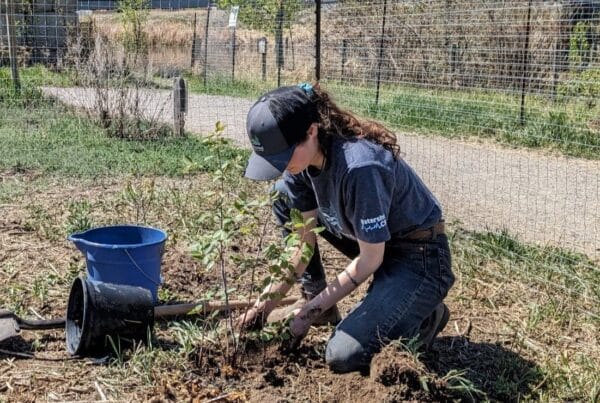By Lisa Houle | January 19, 2022
It’s interesting to see the twists and turns life takes when faced with a career path decision. ‘Should I take this position?’ ‘Should I take that one?’ Sometimes the choices we make lead us down unexpected paths. Former ISCBC contract employees have gone on to do some fascinating things! We love catching up with their professional adventures, to discover how the skills they built with us have served them.
The contracts referred to are the Job Creation Program (JCP) started in 2015, and StrongerBC (SBC) which began in 2020.JCP was an employment and skills training program in partnership with WorkBC, Ministry of Social Development and Poverty Reduction. Training crew members with skills to operate safely and competently on ground operations equipped them for entry level employment in any natural resources sector. SBC was a collaborative program with the Province of BC, supporting individuals in training and providing work for people whose jobs were impacted by the COVID 19 pandemic. Both contracts provided the extra hands needed to help protect BC’s lands and waters from invasive species, while training people to work in the environmental protection field.
This is our second installment in a series of catching up with past skills employment members. We hope you enjoy hearing their stories!
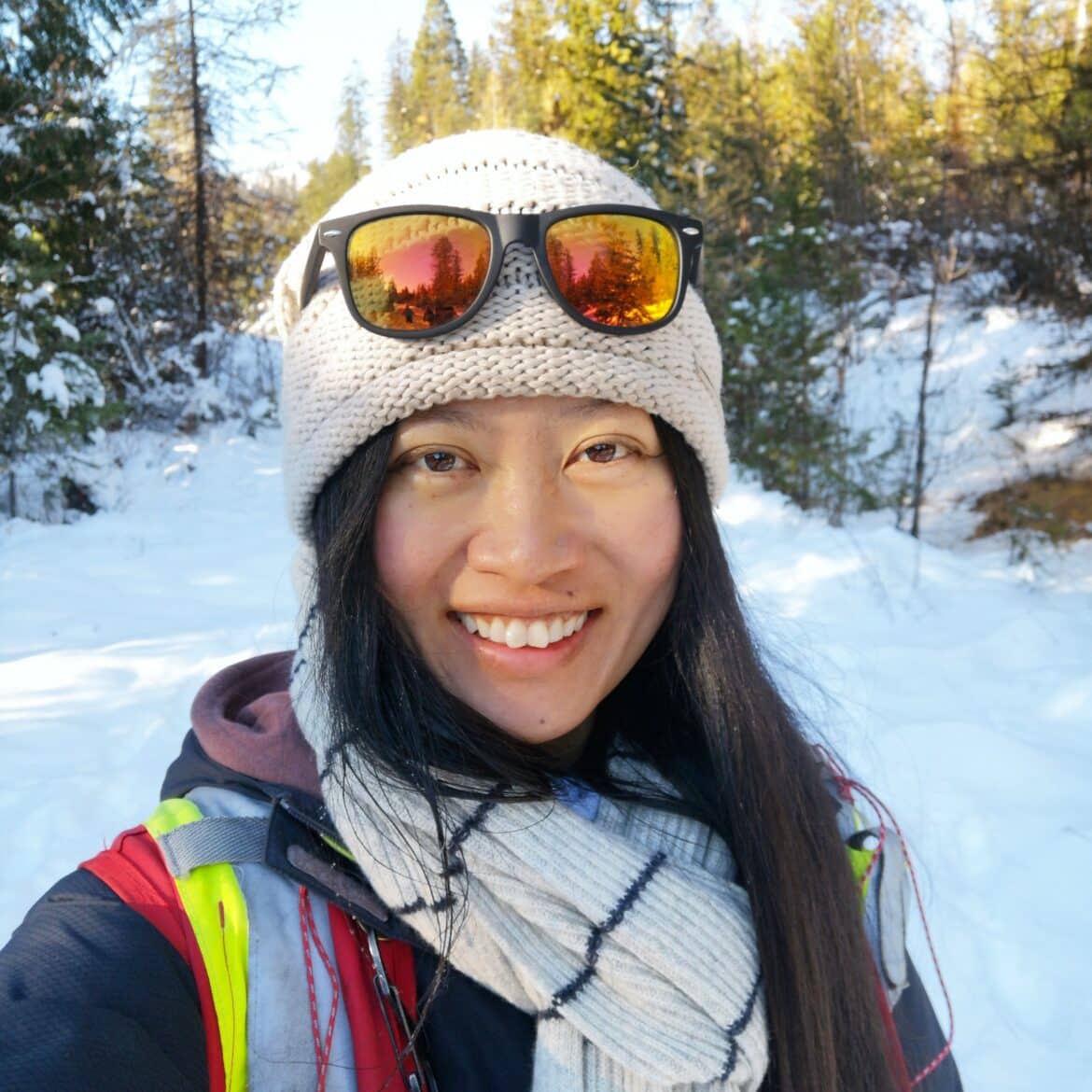
Lindy Lin is a tmixw (Wildlife) Technician for Okanagan Nation Alliance, based out of the Columbia Region Office in Castlegar, BC, in the traditional territories of the Ktunaxa, the Syilx, the Sinixt, and the Secwepemc Peoples. She joined ISCBC as an Action Team member in Nelson, BC in the summer of 2021, went back to school in the fall, then came back to ISCBC as an Action Team Supervisor in 2022 before landing her current role.
Why did you decide to take the job and what were you doing before this?
As I was finishing my first year of Recreation Fish and Wildlife diploma program at Selkirk College, I was searching for a summer position in the natural resources sector. It was a challenging and stressful time to job hunt, having no prior experience in the environmental field and during the Covid-19 pandemic. The job description for an Action Team Member looked perfect for someone with no prior experience, providing skills and training on top of field work experience. I was so happy when I got the job offer!
What was your experience like?
It was the most rewarding job I ever had. I only had one thing in mind, ‘I love nature and everything in it, so I will do my best to protect the environment.’ That turned out to be the exact mindset I needed going forward. Everyone is so knowledgeable and kind at ISCBC. It was a positive experience, and the certified training and expert knowledge was excellent. It made me feel very confident.
Do you think your work with ISCBC helped you with your future role?
Definitely! I have become more aware of my surrounding environment, applying better practices in my personal and professional life – Play Clean Go and Clean Drain Dry are just two examples. I made many professional connections through my work with ISCBC, which is very beneficial for my current position. I am working in partnership with some of those connections now.
Coolest experience on the job with ISCBC?
If I have to pick one, it would be working with Kootenay Native Plant Society (KNPS) and Nature Trust of BC field crews at Marsden Camas Site near Nelson, BC. We worked collaboratively to manually remove invasive weeds in plots. Then we seeded the plots with native seeds KNPS collected from similar ecosystems. It was very satisfying giving native species a boost to thrive again in their home soil.
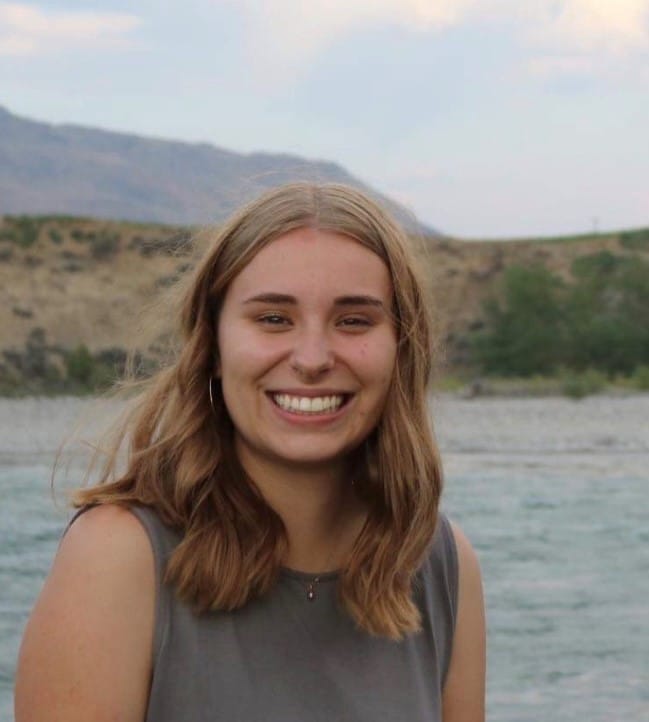
Carmen Peterson is a member of the Environmental Consulting team at Urban Systems. She joined ISCBC in May 2021 as an Action Team Member based in Vernon, BC. The team worked throughout the North Okanagan, collaborating with the Ashcroft and Salmon Arm teams, a diverse experience Carmen considers invaluable.
Why did you decide to take the job and what were you doing before this?
I decided to take the job with ISCBC because I wanted to gain experience working with plants and doing field work. Prior to working with ISCBC I had been a Youth Team volunteer for many years, so I had a general understanding of invasive species. However, I was looking to improve my skills and gain valuable field experience. This position allowed me to get my foot in the door in the environmental profession, which is what I was looking for as a student.
What was your experience like?
My experience as an Action Team Member was so good! Coming from an Environmental Chemistry background and hoping to work in the Climate Change sector, I didn’t have a strong interest in plants prior to this position. However, working with ISCBC gave me the opportunity to enhance my appreciation of plant ecology and our province’s biodiversity. I really enjoyed learning how herbicides function within the plant’s system and how they can be properly used to manage invasive species. Working throughout the province to positively impact our native species was incredibly rewarding. I can’t travel anywhere now without noticing invasive species and thinking about their impacts.
Do you think your work with ISCBC helped you with your future role?
It definitely helped me in my current Environmental Consulting position. I gained experience conducting field work safely and efficiently, which I contribute as a key factor in getting this position, and it has greatly helped me in my work since then. I am also the only person on my team who has experience working with invasive species, so this knowledge sets me apart.
Coolest experience on the job with ISCBC?
Catching root weevils with Dr. Catherine Tarasoff! The weevils are easiest to collect in hot temperatures with no wind, so it was a very exhausting day but super cool to see biocontrol in affect!
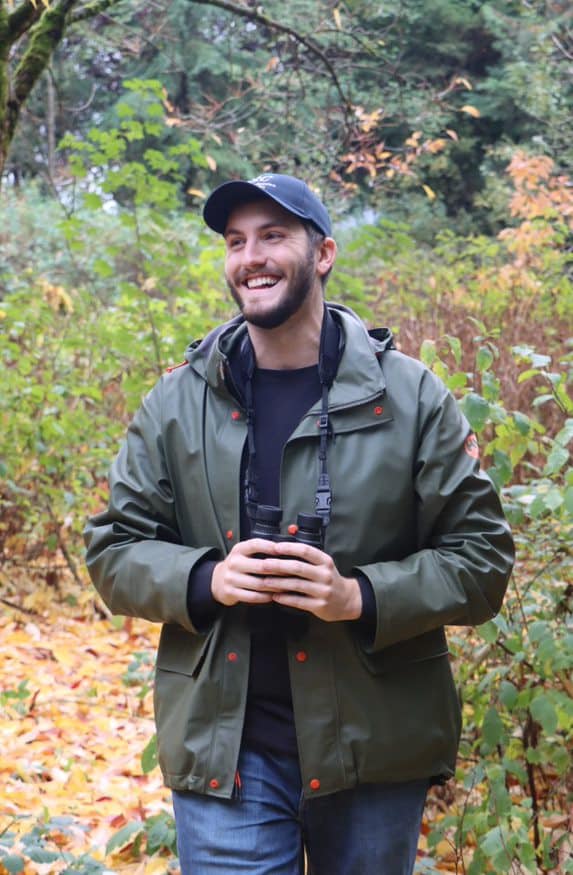
Steven Hayward is a Technical Specialist on the Science and Research team at ISCBC. He started his employment with us as an Action Team member in Nanaimo, BC in 2021 before landing his current role.
Why did you decide to take the job and what were you doing before this?
I wanted to work in British Columbia’s environmental field to help conserve its biodiversity and wilderness. I had a variety of experience in the biology field in Alberta and Indonesia and I wanted to apply my skills and knowledge on Vancouver Island.
What was your experience like?
It was great! We had an awesome crew with some amazing people interested in doing the same work and learning as much about ecology and species identification at the same time.
Do you think your work with ISCBC helped you with your future role?
Absolutely, working in the field has given me great experience and perspective when keeping our database and fact sheets up to date, doing outreach support or writing grant applications for more on the ground project work.
Coolest experience on the job with ISCBC?
Removing invasive species like Himalayan blackberry and Scotch broom from Oyster River Shoreline Park near Campbell River, a sensitive ecosystem with an endangered flowering plant Deltoid Balsamroot (Balsamorhiza deltoidea) and moss Coastal Triquetrella (Triquetrella californica).
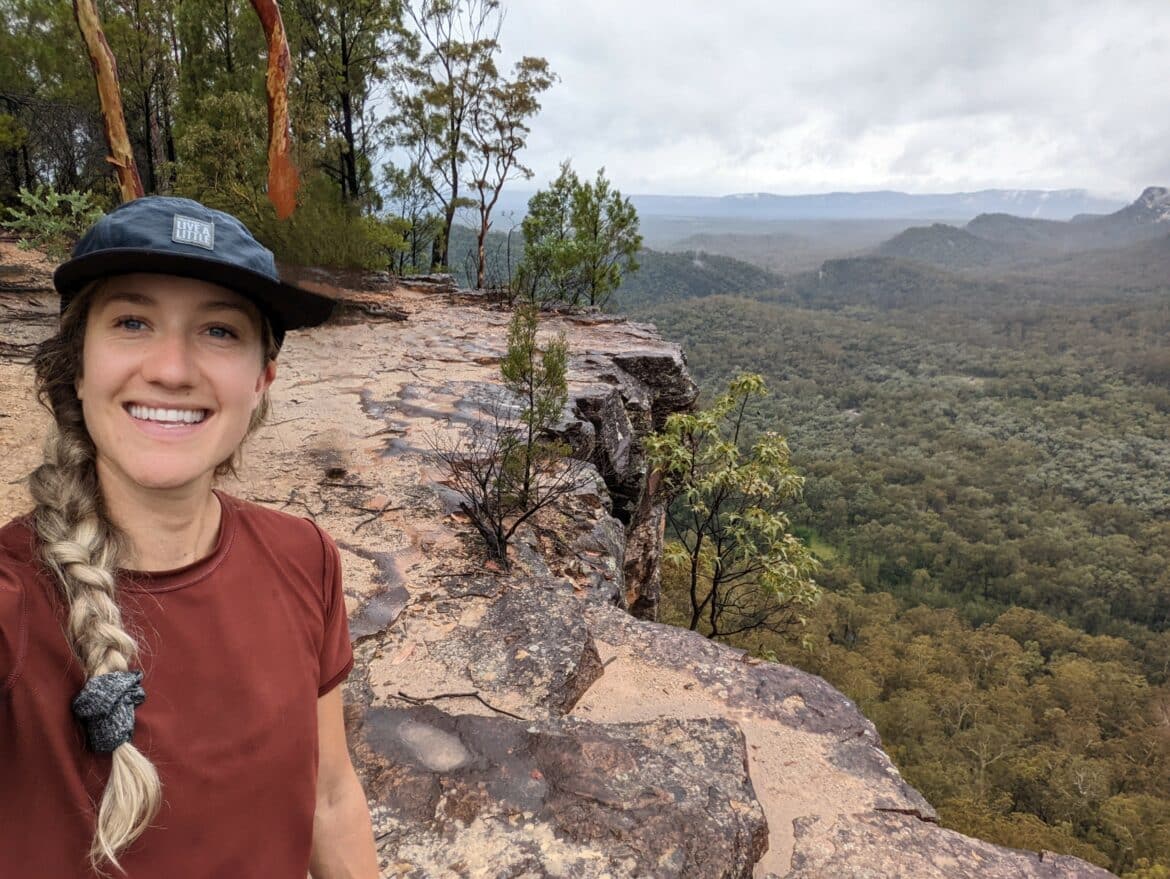
Kim Kaiser is currently on an extended vacation in Australia, however for the past four and a half years she worked for the Columbia Shuswap Invasive Species Society, both as an Education and Outreach Coordinator and an Interim Field Program Coordinator. She joined ISCBC in the summer of 2016 as a JCP crew member in Revelstoke, BC.
Why did you decide to take the job and what were you doing before this?
The winter before I started with ISCBC I was working at a heli-skiing lodge near Revelstoke. I had recently graduated from university, and I was looking to build field skills and learn about the local environment.
What was your experience like?
The program was a great introduction to invasive species management. There was an emphasis on learning and skill building which was very valuable. The experience was a lot more impactful on my life and career than I expected it to be! I had no idea how complex the world of invasive species was and participating in the program opened my eyes to the number of organizations and individuals that work together on invasive species issues in our province.
Do you think your work with ISCBC helped you with your future role?
Absolutely, the JCP program was helpful in many ways! Learning the Invasive Alien Plant Program (IAPP) and strengthening my plant identification skills set a solid foundation for my future roles. We worked on sites throughout the region, and it helped me gain familiarity with important ecological areas and priority sites. Another valuable part of the program was working alongside other local organizations and having the opportunity to meet other environmental professionals. I was new to Revelstoke, so it was a great opportunity to meet new people and network.
Coolest experience on the job with ISCBC?
We worked in an area called Crazy Creek on a Marsh plume thistle site for a few weeks. It was up a forestry road in a beautiful part of the region, and I loved working in the mountains all day.
Were you a JCP or StrongerBC employee of ISCBC? We’d love to hear from you to feature you in our next article! Contact Lisa at lhoule@bcinvasives.ca
Lisa is a Communications and Outreach Coordinator at ISCBC. She values a diverse environment and connecting with others about environmental protection. In her spare time Lisa enjoys spending time at the ocean and beach combing for sea glass. You can reach Lisa at lhoule@bcinvasives.ca
Share



